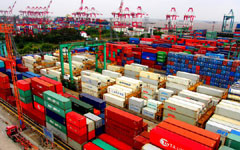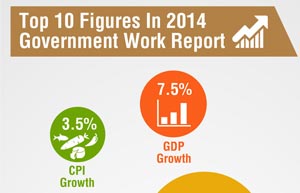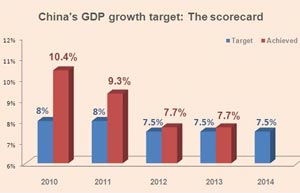Nation to see higher quality, lower growth in trade
By Li Jiabao (China Daily) Updated: 2014-03-06 07:18China lowered its annual target of trade growth to 7.5 percent in 2014 after the world's second-largest economy became the leading goods trader last year.
Meanwhile, the government has shifted its focus to improving the country's trade quality and boosting its exports amid a climate of rising costs at home and new rules coming from regional trade agreements.
|
 |
 |
He added that total imports and exports are projected to grow at about 7.5 percent this year.
"We will keep export policies stable, accelerate reform to facilitate customs clearance and extend trials of cross-border e-commerce," said Li, adding that "We will implement policies to encourage imports and import more products in short supply in China."
Other goals include supporting businesses in "creating Chinese brands" and developing international marketing networks, he said.
"We will encourage the export of complete sets of large equipment" for telecommunications, railways and power stations "and enhance the international reputation of Chinese equipment", the premier said.
In 2013, China's combined imports and exports rose 7.6 percent to $4.16 trillion, replacing the United States to become the world's biggest trader in merchandise for the first time, according to the Ministry of Commerce.
But the growth pace fell behind the 8 percent target outlined by the government early last year.
Foreign trade in 2012, with year-on-year growth of 6.2 percent, missed the 10 percent growth target for that year. But China's foreign trade maintained double-digit expansion in past decades except for financial crisis-hit 2009.
|
 |
 |
- NHTSA says finds no 'defect trend' in Tesla Model S sedans
- WTO rare earth ruling is unfair
- Amway says 2014 China sales may grow 8%
- President Xi in Europe: Forging deals, boosting business
- CNOOC releases 2013 sustainability report
- Local production by Chery Jaguar Land Rover this year
- Car lovers test their need for speed in BMW Mission 3
- China stocks close mixed Monday

















